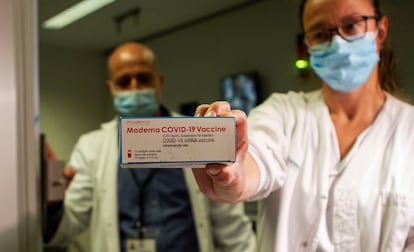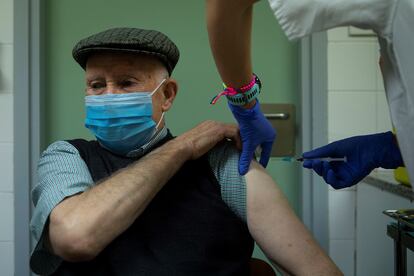‘The best coronavirus vaccine is the one that reaches my arm first’
Debating which inoculation is better does not make sense, say experts, as the drive is a collective – not individual – effort to slow the spread of the virus
When people go in for their flu shots, they don’t normally know which company made the vaccine. But these days it is hard to find anyone who is not familiar with the brand name of their Covid-19 jabs. In fact, some individuals even have strong preferences about which one they’d like to get.
For them, there is some good news and some bad news. The bad news is that they don’t get to choose. The vaccination process is not so much an individual act as a collective strategy to protect the entire population – particularly its most vulnerable members.
The good news is that, out of the currently available vaccines – in Europe and Canada these are Moderna, Pfizer-BioNTech and Oxford-AstraZeneca, while the United States is administering the first two and has recently authorized the Janssen shots from Johnson & Johnson – it is not possible to say that one is clearly better than the other. At least not at this point in time. As the epidemiologist Carlos Álvarez puts it: “The best vaccine is the one that reaches my arm first.”
Experts insist that the most sensible thing to do, for personal and collective protection, is for everyone to take whichever vaccine they are assigned, as soon as possible
First of all, it’s important to define what we mean by “better.” A one-dose vaccine would be better than a two-dose treatment. A vaccine that could be taken orally would be better than one requiring a jab. Doses that could be kept at room temperature would be better than those requiring ultra-cold conditions. A vaccine that prevented infection of any kind would be better than one that only prevents symptoms, but then again it is more practical to have a vaccine that eliminates the possibility of severe illness and death than one that is just highly efficient against mild forms of Covid-19. A vaccine tested on people of all ages would be preferable to one that has only been tried with certain groups, although for the latter both might be just as good.
For now, there is no vaccine that gets top scores in all of these categories. Each one has its own set of characteristics that have been assessed at different clinical trials, making them difficult to compare.
Perhaps one day, one vaccine will prove to be much better than all the rest. And perhaps there will be enough doses for everyone. But that is not the case today. And so experts insist that the most sensible thing to do, for personal and collective protection, is for everyone to take whichever vaccine they are assigned, as soon as possible.

“We don’t have enough data to establish that the three vaccines we have – or four, including Janssen – are any different in terms of efficacy,” says Federico Martirón, head of pediatrics at Clínico Universitario Hospital in Santiago de Compostela, in Spain’s northwestern region of Galicia. “Not only is each study different – these are still underway. The results were ‘frozen’ in time in order to send the data to the regulatory agencies [once the vaccines were proven to be safe and effective], but the studies are ongoing.”
Martirón uses the AstraZeneca vaccine as an example: a month after sending in the data to the European Medicines Agency, the vaccine’s efficacy had risen from 59% to 70%. But even these figures are not so easy to interpret. “That’s what the headlines say, but if we take a closer look at the confidence intervals, we see that efficacy is really quite similar for all the vaccines,” he says. In other words, because of the statistical margins, if clinical trials were done all over again, these efficacy rates could easily coincide across all available treatments.
Public Health Scotland conducted a study based on 1.1 million people, half of whom received the AstraZeneca vaccine while the other half got the Pfizer shots, and concluded that protection levels were similar in both cases. Five weeks after receiving the first dose, the risk of hospitalization dropped 94% with the AstraZeneca vaccine and 85% with the Pfizer-BioNTech vaccine, compared with unvaccinated people. In people 80 and over, the risk dropped by 95% with the AstraZeneca shots and 81% with Pfizer-BioNTech. These figures have yet to be peer reviewed and published in a scientific journal.
Isabel Sola, a virologist at the National Biotechnology Center of Spain’s National Research Council (CSIC), believes that during Phase 4 of massive vaccine distribution it will be possible to obtain much more realistic results, and adjust the vaccination campaign accordingly to assign the most appropriate doses to each target group.
“But in the meantime, we cannot give up on administering the vaccines that have already been authorized, all of which have an efficacy of more than 60%,” she notes. “Right now the priority is to extend vaccination as quickly as possible to stop the virus in its tracks. The more it circulates, the more opportunities it has to morph and evade vaccine immunity.”

Some better than others
So is it possible that some vaccines are indeed better than others? “Yes, of course, because they use very different systems, but we still can’t know for sure because there isn’t enough data. The important thing is that all approved vaccines are safe and work very satisfactorily,” says José Jiménez, a researcher at the Department of Infectious Diseases at King’s College London.
“The thing is that people are used to shopping around for the best: for instance they’ll want a cellphone with a screen that’s half an inch bigger or a battery that lasts a little longer,” he adds. “But that’s not the way it works with vaccines, among other things because there aren’t enough for everyone. Besides, it’s been shown that all the approved ones are safe and efficient at preventing severe forms of the disease and deaths, which is really the main thing.”
Yet personal preferences are turning into something of a problem in some countries. In Germany, widespread rejection among the public of the AstraZeneca vaccine means that thousands of vials are sitting unused, and only a quarter of available doses have been administered. In Spain, administration of this particular vaccine is also lagging behind the other two, but that’s mainly due to organizational problems.
In Spain, only 2% of people who were offered a vaccine have rejected it, according to figures provided last week by Silvia Calzón, the secretary of state for health. This percentage also includes individuals who could not be vaccinated for medical reasons.
The problem is that some people look at vaccination from an individual viewpoint. But you have no right to demand maximum certainty if you are not in a maximum-risk groupJosep Lobera, expert advising the government on vaccination protocols
Still, there are a few minority groups who prefer the Pfizer-BioNTech and Moderna vaccines over AstraZeneca. This is partly because early studies showed lower efficacy, and partly because of a clinical trial in South Africa that was halted due to its poor performance against the variant first detected in that country. “The messenger RNA vaccines [Pfizer and Moderna] showed a much smaller drop in efficacy, but that was in in vitro trials – we haven’t seen how they behave in the real world,” notes Martirón.
In any case, the World Health Organization (WHO) is recommending the AstraZeneca vaccine in all contexts and for all age groups. Alejandro Cravioto, president of an expert committee advising the WHO on Covid-19 vaccines, said that there is “indirect evidence” that it prevents the most severe forms of the disease regardless of the variant. But this cannot yet be positively stated, as samples are too small to provide solid evidence.
It also doesn’t help that many European countries, Spain included, are not recommending the AstraZeneca vaccine for people over 55 years of age, despite statements to the contrary by the WHO, the European Medicines Agency and the UK. The decision to restrict its use to the younger population was based on the fact that there is insufficient data to determine with certainty that it would be effective on the older population. But more recent numbers are seeing Spain and other European countries reconsider their position. France and Germany have already gone back on their initial stance, although Thomas Mertens, president of Germany’s advisory committee, last week admitted that the country’s original decision contributed to giving the AstraZeneca vaccine a bad image. Elvis García, who holds a PhD in epidemiology from Harvard University, agrees: “Introducing messages of doubt about a vaccine that has been shown to be effective is incomprehensible. It is another major mistake in the political – not medical – management of this pandemic,” he says.
“The problem is that some people look at vaccination from an individual viewpoint,” says Josep Lobera, a sociologist who is part of a group that advises the Spanish government on the national vaccination protocol. “But you have no right to demand maximum certainty if you are not in a maximum-risk group.”
This view is shared by Ignacio Rosell, member of the expert coronavirus committee for the regional government of Castilla y León: “The goal is for all of us to be vaccinated as soon as possible, which means quickly using all the vaccines reaching the priority groups in the correct order.”
The internist Miguel Marcos illustrates the difference between existing vaccines with the following story: “Let’s imagine that we’re in a horror movie and we are being chased by a bunch of zombies. We reach a village where there’s bicycles and cars, but not enough for everyone. If we manage to do things in an orderly manner, then the most reasonable thing to do is for the cars to be used by those who cannot walk fast (the elderly), those who can drive (logical) or those who can bring more cars to aid this group or other groups. And the logical thing would be for the bikes to be used by those who can pedal and escape from the zombies. This would be the AstraZeneca vaccine: less effective against Covid-19, but without severe cases in clinical trials.”
Rosell adds some nuance to this story: “Perhaps what we take to be bikes are in fact motorcycles.”
English version by Susana Urra.
Tu suscripción se está usando en otro dispositivo
¿Quieres añadir otro usuario a tu suscripción?
Si continúas leyendo en este dispositivo, no se podrá leer en el otro.
FlechaTu suscripción se está usando en otro dispositivo y solo puedes acceder a EL PAÍS desde un dispositivo a la vez.
Si quieres compartir tu cuenta, cambia tu suscripción a la modalidad Premium, así podrás añadir otro usuario. Cada uno accederá con su propia cuenta de email, lo que os permitirá personalizar vuestra experiencia en EL PAÍS.
¿Tienes una suscripción de empresa? Accede aquí para contratar más cuentas.
En el caso de no saber quién está usando tu cuenta, te recomendamos cambiar tu contraseña aquí.
Si decides continuar compartiendo tu cuenta, este mensaje se mostrará en tu dispositivo y en el de la otra persona que está usando tu cuenta de forma indefinida, afectando a tu experiencia de lectura. Puedes consultar aquí los términos y condiciones de la suscripción digital.









































